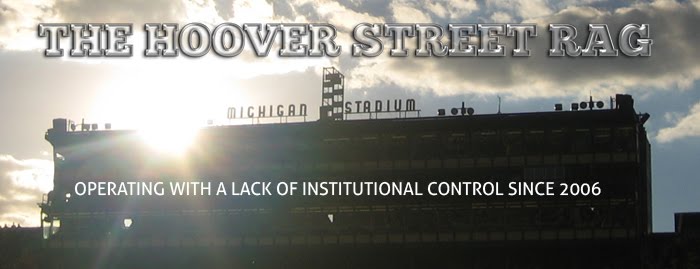A post on mvictors discusses whether The Victors was "ripped off" from the 1898 march "Spirit of Liberty" by George Rosey.
The short and insufficient answer: The second trio of Spirit of Liberty sounds very similar to the trio of The Victors.
Listen for yourself around the 1:40 mark:
But does this constitute "ripping off," to use the parlance of our times? Interestingly, the song can be found on the album "Karussells of Europe," where its Amazon listing describes Spirit of Liberty as "traditional carousel tune."
Some guy on a forum posed the same question to the Library of Congress via their "ask a librarian" function, and got this answer:
"The Spirit of liberty march" was composed by George M. Rosey (AKA Rosenberg) and it was published in 1898. "The Victors" march was composed by Rosey's friend, Louis Elbel in 1899. The trio of "The Victors" is similar to the last section in Rosey's march which had been written a few months earlier. The two composers were reported to be good friends and the arrangement [Elbel's trio] was presumably made by mutual agreement.
Guy on a Forum isn't exactly a rock of journalistic integrity, but the LoC librarian gave his source as William H. Rehrig's "The Heritage encyclopedia of band music", published at Westerville, Ohio by Integrity Press, vols.1-2, in 1991, with a supplemental vol. 3, published in 1996.
So, yes, most of the melody of the chorus of The Victors is the same as the Spirit of Liberty march. Whether this constitutes deliberate plagiarism is largely irrelevant and debatable, both on the grounds that they were friends, and that this happened before the 1909 Copyright Act was passed.
Supposing it were corrected, it would be "The Victors, music by Louis Elbel and George M. Rosey, lyrics by Louis Elbel." Or, "The Victors, music by Louis Elbel, chorus inspired by a trio from "The Spirit of Liberty March" by George M. Rosey, aka Rosenberg, lyrics by Louis Elbel." Regardless, the lyrics are Elbel's, Rosey never called him out on it, and may have in fact given Elbel his blessing. If the Easter Bunny is dead, it's a good thing he gave his friend the recipe for Peeps a hundred years ago.

1 comment:
Once again regarding the origin of The Victors.
First, there is no question that the trio of The Victors is essentially the same as the trio of Spirit of Liberty. The copyright for SOL is dated April 11, 1898, more than six months before the famous Thanksgiving Day football game. So how did Elbel discover SOL. There are several theories and no one will ever know. However in my humble opinion, I think the most simple answer is the most likely. Elbel’s family owned a music store. It does not take much imagination to think that sometime when he was home during the summer, he reviewed the latest piano sheet music his family was selling and spied the rather garishly bunting and statue decorated cover. He most likely reviewed the music or possibly played it.
Second, do we give him the benefit of the doubt that he subconsciously recalled the melody after the game and incorporated it into a new march? Possibly, but I think it is deeper than that. The descending notes of the second strain of The Victors appear (at least to me) to be similar to the descending notes of the first strain in SOL. In addition, the da-tadada-tadada of the introduction of The Victors can be found in the SOL. Certainly this theme is found in other music (William Tell) but it is in SOL too. Because of three similarities, I find it hard to believe it was subconscious
Third, did Elbel and Rosenberg know each other before the writing of The Victors? Rosenberg was 13 years older than Elbel and grew up and was educated in Germany. After immigrating to the United States, he lived and worked in the New York City area. Elbel grew up in South Bend and attended school (obviously) in Ann Arbor. It is highly unlikely they ever met prior to the writing of The Victors.
Fourth, did Elbel receive permission for the Victors from Rosenberg? No one will ever know. In spite of the published statement by Rehrig, a friend of mine knows Rehrig and asked him where he got his information that the two composers were good friends. He said that he didn’t remember writing it and had no idea if the two ever knew each other.
Finally, what is the most important issue here? It is simply that Elbel went to the grave telling the same story that the tune came to him out of thin air. He could have easily corrected the origin of the music and no one would have ever thought the less of him. Certainly not over 100 years later. (Does anyone care that the Yellow and Blue actually comes from and is credited to the Pirates Chorus of the opera “The Enchantress”?) After all, The Victors is one of the great marches of all time. Far superior to the SOL which is simply good carrousel music. By continuing to lie and cover up, he violated one of the most basic rules of any university; “Thou shall not plagiarize”. To plagiarize at the university level is grounds for failure if not dismissal. The University should acknowledge this in order to maintain its educational integrity.
Post a Comment